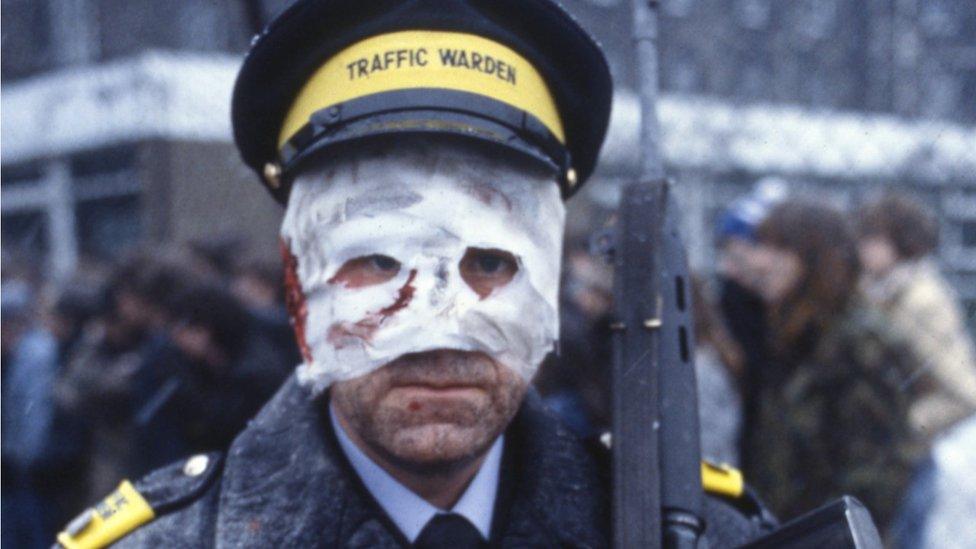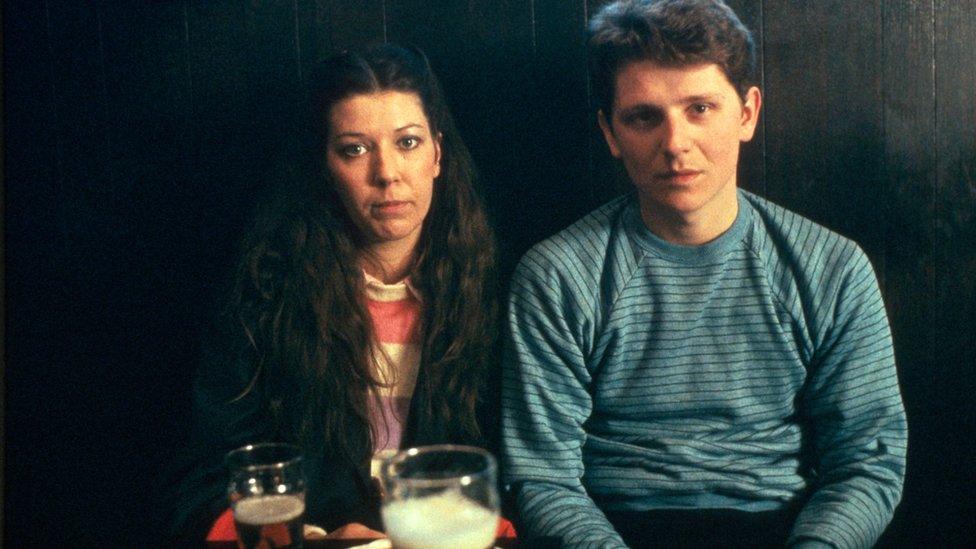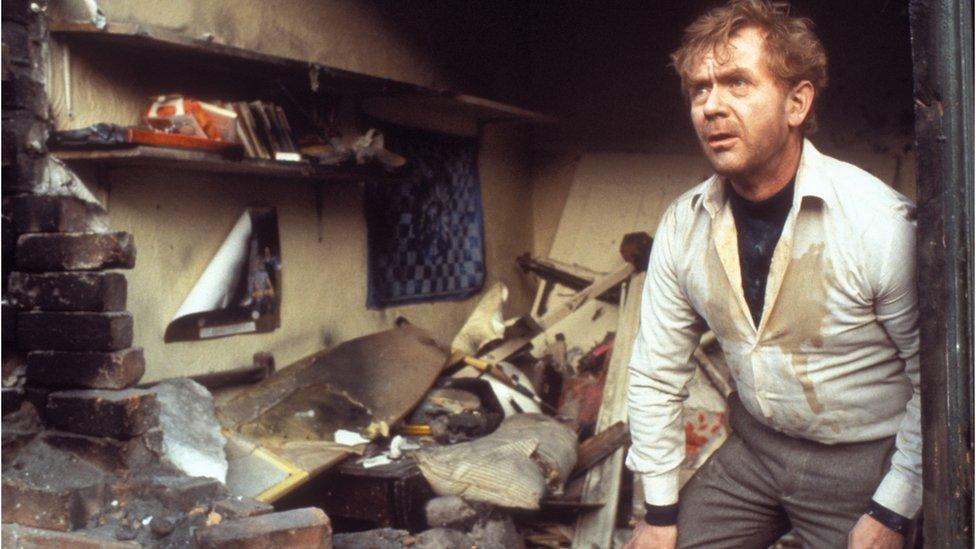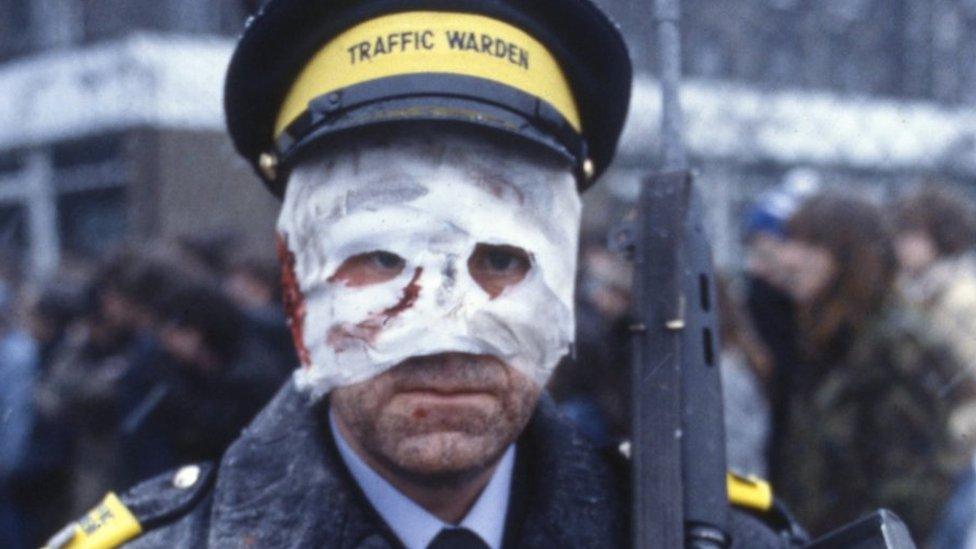Threads: Man who played traffic warden sought by film-makers
- Published

The image of the traffic warden has become synonymous with the 1980s film, Threads
Documentary makers are trying to track down the man who played a post-apocalyptic traffic warden in 1980s TV drama Threads.
The warden appeared as an extra in the 1984 TV film for less than 30 seconds - but his striking image was used to publicise its release.
The dystopian film explored the impact of a thermonuclear blast on Sheffield.
Craig Ian Mann, who is working on the documentary, said he wanted to know how the man felt about the role.
"He has become the iconic image of that film," he said.
"He was on the front cover of the Radio Times, he was on the cover of every video, DVD or Blu-ray of Threads which has been made.
"People even dress up as him for Halloween," he said.
"We went to Sheffield Horror Con at the weekend, and there was somebody dressed up as him.
"He has become an iconic character and if he is still around, I would like to ask him if he is aware of it, and how he feels about it."
The film, written by Kes author Barry Hines, was shown at a time when nuclear war seemed a very real possibility, and shocked and horrified many who saw it.
The story focused around a young couple living in South Yorkshire when a bomb went off, and shows a society breaking down as nuclear winter sets in.
In the aftermath of the blast, a scene depicts increasingly desperate people trying to seek medical help or food, many of whom are herded into some tennis courts.
Mr Mann said: "Patrolling these courts is a traffic warden with a gun in his hand, and we would love to be able to track him down.

Karen Meagher and Reece Dinsdale played the young couple at the heart of the film's opening
"We have interviewed about 30 people so far, and none of them know who played the traffic warden in the film.
"He is almost definitely a local person who volunteered to be an extra in the film," he said.
"He may even have been a traffic warden, as his shirt and tie were far too clean for someone who just dressed for an extra that day."
At 34, Mr Mann was too young to have seen the film when it first aired but watched it a few months after moving to Sheffield as a student in 2007.
"Many people say it has shaped their lives in various ways, it was quite deeply affecting and it has stayed with them for a long time," he said.
"I have seen it four or five times since. I think if you didn't see it in the mid 80s, seeing it now is going to have the same effect on you I would say."
He is co-writing the documentary with Robert Nevitt, 44, who is the director of Sheffield horror film festival Celluloid Screams.
Mr Mann said they were asked to make a feature about the locations of the film to accompany its release on Blu-ray.

The drama depicts the grim reality of the impact of a thermonuclear blast on Sheffield
"I said we can do better than that, we are here, we have access to the people who were extras, actors, or in it in some way or another," he said.
"We got the green light to put together a documentary and have been talking to as many people as we can find who were involved."
Some of those the pair have tracked down so far include a volunteer fire crew, who made sure none of the fires on set got out of control, and a woman and her son, who was just two years old at the time, who was shown being snatched from his pram as the bomb detonated.
Mr Mann said: "The boy's mother can be seen picking him up out of his pram and running, then you can see his pram overturning in the middle of The Moor.
"They answered an ad in the Sheffield Star, they went for auditions and then they were given call sheets and told when and where to turn up.
"However some people turned up at two, three or four of the film's scenes so feature more than once in the film."
Lord David Blunkett has also been interviewed, as he was the leader of Sheffield City Council when the film was first shown.
"Normally when we are trying to find somebody, there is someone who can say 'that was my father, brother, grandad' - but this time, we're not getting anything," he said.

Follow BBC Yorkshire on Facebook, external, Twitter, external and Instagram, external. Send your story ideas to yorkslincs.news@bbc.co.uk, external.
Related topics
- Published12 July 2023
